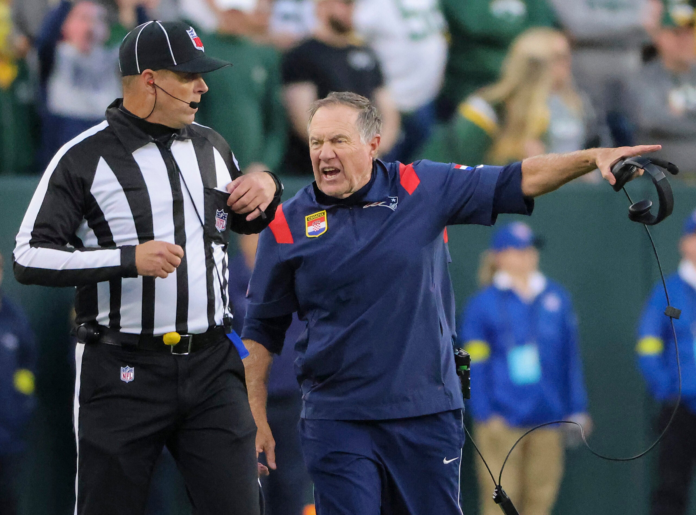Patriots 5 takeaways from the Patriots’ overtime loss to the Packers New England’s rookie third string quarterback kept it close in an overtime loss. Bill Belichick makes his case to a referee during the Patriots-Packers game. Matthew J. Lee/Globe Staff
The Patriots lost to the Packers 27-24 in overtime on Sunday, dropping the team’s record to 1-3.
Entering the game without Mac Jones (out with an ankle injury), New England was quickly forced to play third-string quarterback Bailey Zappe when backup Brian Hoyer exited with a head injury during the first quarter.
Here are a few takeaways:
Bailey Zappe unexpectedly made his NFL debut.
Hoyer led the Patriots to the opening score of the game (a 37-yard Nick Folk field goal) after a 10-play drive. On the second drive, he was sacked on a third down and immediately exited the field. Zappe replaced him late in the first quarter to make his NFL debut.
Advertisement:
(After being evaluated, Hoyer was ruled out with a head injury.)
Zappe struggled for much of the first half in the difficult circumstances and fumbled in the second quarter after being sacked. Still, New England held a 10-7 halftime lead following cornerback Jack Jones’ interception return for a touchdown on the Packers’ ensuing drive.
In the second half, Zappe initially experienced more success as the offensive line found its footing. In two run-heavy drives, he complemented the offense with timely play-action passing, including a 25-yard touchdown pass to DeVante Parker in the third quarter (the first touchdown of Zappe’s career).
As the game progressed, however, the Patriots’ offense slowed to a halt. After Damien Harris scored with just over 11 minutes to go in regulation, New England did not record another first down in the game.
Zappe, who played admirably in a difficult moment, finished the game 10-15 for 99 yards passing and a touchdown.
The offensive line gave the Patriots a chance.
Whatever the Patriots’ situation may have been at quarterback — which, even in the ideal scenario, involved a backup playing on Sunday — the offensive line provided a large degree of stability.
Harris and fellow running back Rhamondre Stevenson were able to find room (and finish plays off with tough running). In all, the Patriots rushed for 167 yards, averaging 5.1 yards per carry.
And while it was an imperfect day from a pass protection standpoint (the Packers recorded four sacks), New England was able to provide Zappe with solid protection at several important points during scoring drives.
The Patriots’ defense couldn’t stop the run.
On the other side of the ball, the Patriots’ defense struggled in an equal and opposite way to contain the Packers’ ground game.
Advertisement:
Though Aaron Rodgers was unable to find a consistent rhythm with his receiving corps for much of the day (throwing for just 44 yards in the first half), Green Bay was able to move the ball with running backs.
The Packers cut through the Patriots for 199 rushing yards on 35 carries (averaging 5.7 yards per carry).
The Patriots were without starting defensive tackle Lawrence Guy, but have now allowed 188 and 199 rushing yards in back-to-back losses.
Jack Jones made plays in his first career start.
Due to fellow cornerback Jalen Mills’ injury, Jones got the start for the Patriots alongside Jonathan Jones.
Jones, 24, made some notable plays for New England. His first came in the first quarter when he forced (and recovered) a Romeo Doubs fumble.
Jones then jumped a Rodgers pass intended for Allen Lazard and ran it back for a Patriots touchdown right before halftime:
Though he was also guilty of some missed tackles, Jones — who, like Zappe, was a 2022 fourth-round pick — showed some good potential in what was his biggest NFL test so far.
Each team appeared to have issues with the officiating.
A recurring subplot during the game seemed to be both teams encountering controversial calls or inexplicable rulings.
For Green Bay, the most prominent example came on Zappe’s touchdown pass to Parker, during which the play-clock seemed to expire by multiple seconds, yet a delay of game penalty wasn’t called.
Advertisement:
Belichick had several heated exchanges with referees on the sidelines, including one “livid” moment after Doubs dropped what would have been a touchdown pass in the fourth quarter, but the Green Bay offense was given extra time as the play was reviewed.


